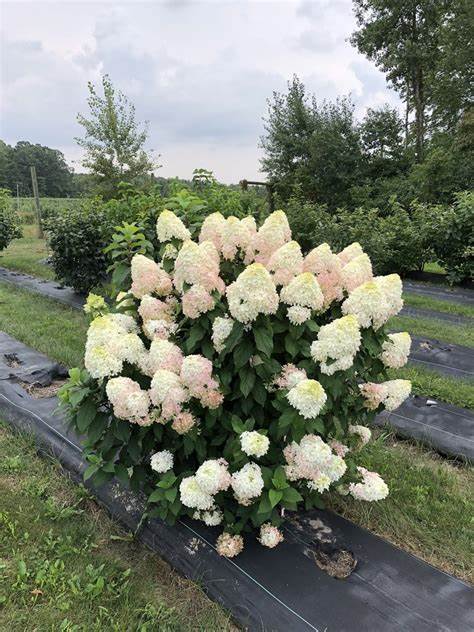Bylands
Quick Fire Fab Hydrangea
Quick Fire Fab Hydrangea
Couldn't load pickup availability
Hydrangea paniculata ‘Quick Fire Fab’
Quick Fire Fab® Hydrangea is a cold-hardy, early-blooming, and easy-to-grow deciduous shrub known for its large panicle flowers that transform from bright white to deep raspberry-pink throughout the season. It is a fast-growing, low-maintenance, and drought-tolerant shrub that makes an excellent hedge, specimen plant, or foundation shrub in Southwest Saskatchewan.
Planting & Location
- Hardiness Zone: 3-8 (very winter-hardy, ideal for prairie climates)
- Mature Size: 6-8 feet tall, 5-6 feet wide
- Growth Rate: Fast (up to 24 inches per year)
- Sunlight Needs: Full sun to partial shade (best flowering in 6+ hours of direct sun)
-
Soil Preference:
- Prefers well-drained, loamy soil.
- Tolerates clay, sandy, and slightly acidic to neutral soils.
- Avoid overly wet or waterlogged conditions, as hydrangeas dislike standing water.
- Spacing: 5-6 feet apart for hedging, 6+ feet apart for individual shrubs.
Watering
- Young Plants (First Year): Water deeply 2-3 times per week to establish roots.
- Established Shrubs: Drought-tolerant but benefits from weekly deep watering in dry conditions.
- Avoid Overwatering: Prefers moderate soil moisture but does not tolerate soggy soil.
Fertilizing
- First Year: No fertilizer needed—focus on root establishment.
-
Mature Shrubs:
- Apply a slow-release balanced fertilizer (e.g., 10-10-10) in early spring to encourage healthy growth and flowering.
- Organic alternative: Compost or well-rotted manure in spring.
- Avoid high-nitrogen fertilizers, as they promote leafy growth at the expense of flowers.
Pruning & Maintenance
- Best Time to Prune: Late winter to early spring, before new growth starts.
-
How to Prune:
- Quick Fire Fab® blooms on new wood, so pruning in early spring will not reduce blooms.
- Remove dead, damaged, or weak branches to promote healthy growth.
- Trim lightly to shape the plant and maintain size.
- For larger blooms, thin out smaller stems to allow stronger growth on fewer branches.
Flowers, Foliage & Seasonal Interest
- Bloom Time: Early summer to fall (June-September)
-
Flower Color Progression:
- Early season: Bright white blooms
- Mid-summer: Light pink blush begins
- Late summer to fall: Deep raspberry-pink to red tones
- Fragrance: Mild to none
-
Foliage:
- Spring & Summer: Deep green, oval leaves
- Fall: Leaves take on a burgundy-red hue before dropping
Pest & Disease Management
Resistant to: Drought, urban pollution, and most pests
Common Pests:
-
Aphids – May cause curled leaves and sticky honeydew.
- Solution: Spray with insecticidal soap or introduce ladybugs.
-
Spider Mites – Can cause leaf discoloration in hot, dry conditions.
- Solution: Hose off with water or use insecticidal soap.
Common Diseases:
-
Powdery Mildew – White fungal coating on leaves in humid conditions.
- Solution: Improve airflow and apply fungicide if needed.
-
Leaf Spot (Fungal or Bacterial) – Brown spots on foliage.
- Solution: Avoid overhead watering and remove infected leaves.
Winter Protection
- Highly winter-hardy—no special protection needed in Zone 3-8.
- Mulching: Apply 2-4 inches of mulch around the base (not touching the stems) to insulate roots.
- Pruning in fall is not necessary—leave flower heads for winter interest and cut back in early spring.
Landscape Uses
Perfect for specimen plantings, hedges, and foundation plantings
Fast-growing and easy to maintain
White-to-pink-to-red blooms provide season-long interest
Drought-tolerant once established
Great for fresh-cut and dried flower arrangements
Additional Notes:
- Quick Fire Fab® Hydrangea is one of the earliest blooming panicle hydrangeas, offering a long-lasting color transition and reliable winter hardiness.
- Lifespan: 20+ years with proper care.
- Works well in modern landscapes, cottage gardens, mixed borders, and as a focal point.
Photo courtesy of Proven Winners
Share


